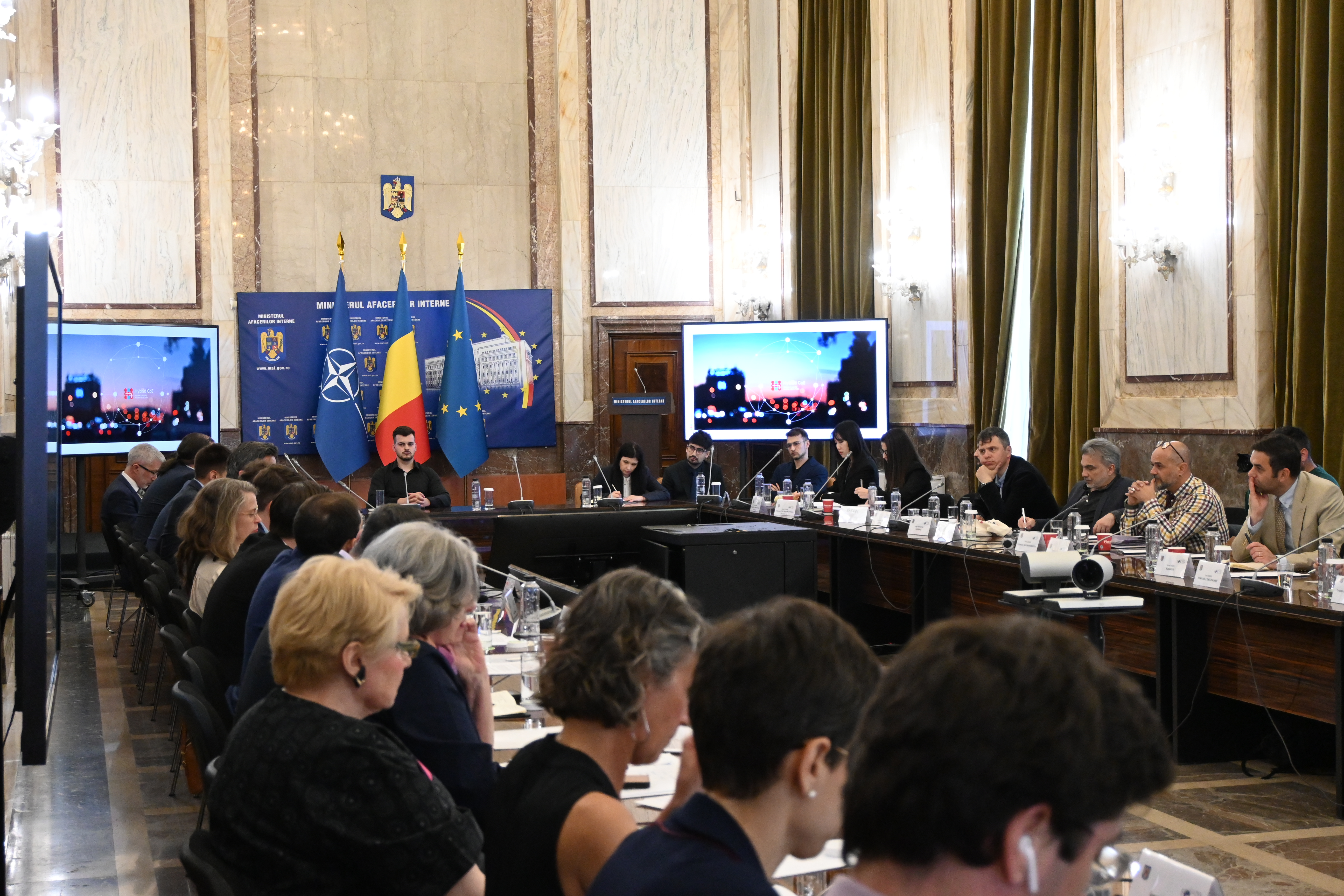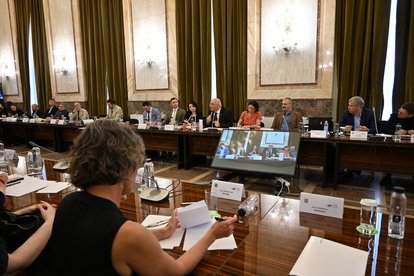Election Interference Romania
Defending Democracy in the Digital Age: Insights from the Bucharest Roundtable on Election Interference

Insights from the Bucharest Roundtable on Election Interference, April 2025
On the 25th of April 2025, the Global Focus Centre, Open Information Partnership and the Friedrich Naumann Foundation held a high-level roundtable in Bucharest to address one of the most pressing challenges facing European democracies today: how to counter election interference from internal and external actors. Held at the Ministry of Foreign Affairs, this closed-door gathering brought together 48 distinguished participants, including six ambassadors,one state secretary, diplomats, experts and civil society representatives from across Europe, to examine the evolving landscape of democratic threats and resilience strategies.
The roundtable's timing was particularly significant, taking place just one week before Romania's presidential elections in May 2025 and following Romania's unprecedented decision to annul the first round of its December 2024 presidential elections due to concerns about foreign interference. The event served as a stark reminder that election manipulation is a present reality that has already disrupted democratic processes in the heart of Europe.

Dr. Raed Arafat, State Secretary, as well as 6 embassies attended the Roundtable on Election Interference.
The Evolving Nature of Democratic Threats
The discussions revealed that election interference has evolved from external attacks to deeply internalised hybrid challenges that exploit domestic vulnerabilities. Participants have emphasised that the threat is not just about foreign actors operating outside their national borders, but also about how these influences are in fact sourced from and embedded within societies, political systems and democratic institutions themselves.
Interference campaigns have evolved into complex, cross-border operations that blend cyberattacks, disinformation and economic manipulation. Russia and China are the primary perpetrators, exerting 'faceless' influence through sophisticated tools such as native ad networks (e.g. MGID and GEOZO), microtargeting and proxy agents. Russia's anti-democratic efforts now also align with movements and ideologies such as MAGA, thereby deepening Moscow's influence.
In Moldova and Georgia, foreign interference often poses as local movements, making it difficult to take counteraction. In Armenia, pro-Kremlin groups promote the idea that Western influence threatens sovereignty and that Western democracy is incompatible with Armenian identity. They advocate for a form of democracy that aligns with "national traditions".
Perhaps most concerning was the identification of internal enablers that amplify foreign interference. These include individuals termed by participants as 'useful idiots', who unwittingly disseminate foreign propaganda; political elites who obstruct institutional reforms for personal gain; and fake political actors funded by hostile foreign powers to generate confusion and undermine legitimate democratic alternatives.The roundtable highlighted how extremism has cynically exploited freedom of speech principles to spread false narratives, particularly in Romania, where this phenomenon has significantly intensified since the pandemic.

Miroslav Sazdovski, Senior Analyst at Hybrid CoE (European Centre of Excellence for Countering Hybrid Threats) Helsinki, presented during the Models of Resilience panel discussion.
Case Studies in Vulnerability and Resilience
The roundtable examined a variety of national experiences that illustrated both the universal nature of these threats and the different responses to them across Europe. Moldova was presented as a state on the front line of comprehensive hybrid warfare, which includes disinformation campaigns, cash smuggling, vote-buying and coordinated smear campaigns targeting economically vulnerable and marginalised populations. The withdrawal of USAID support has made external assistance even more critical for this young democracy.
France's experience showed that even well-established democracies can be caught off guard, as was seen during the 2017 Macron leaks and the Yellow Vest protests. In response, France created Viginum, an institutional body dedicated to combating disinformation, and adopted a 'strategy of attribution' that names and shames foreign influencers. Nevertheless, even France struggles to strike the right balance between countermeasures and preserving freedom of speech.
The Baltic countries have shown relative resilience, thanks to high levels of institutional trust, extensive media literacy programmes and innovative educational approaches, such as gamification via platforms like Minecraft. Their experience suggests that long-term investment in civic education and critical thinking skills can provide significant protection against attempts at manipulation.
Strategic Responses and Recommendations
The roundtable participants appreciated that a comprehensive framework for building democratic resilience, which emphasized the need for sustained, multi-sectoral approaches. Education and media literacy emerged as fundamental pillars, but participants stressed that resilience could not be achieved through simple debunking exercises. Rather, it requires in-depth, long-term civic education that integrates critical thinking into all subjects, rather than treating it as an isolated topic. At the same time, building resilience alone is not enough; since Russia demonstrably pursues a long-term, elaborate strategy of societal transformation, appropriate response measures also need developing, which would raise the costs for aggressors, deny them the ability to cause harm, attribute responsibility and apply proportional sanctions.
The discussions emphasized the importance of institutional tools for detection and attribution, while acknowledging their current limitations. While countries like France have made progress in this area, enforcement remains inconsistent and many nations lack dedicated institutional set-ups for combating disinformation. Notably, Romania has no single responsible body or clear horizontal coordination among multiple dedicated public institutions to address these threats and legislation is still vague and outdated. Strategic communication is also largely lacking and fails to offer the public authoritative information to balance the overflow of manipulative narratives.
A key takeaway from the roundtable was the realisation that governments cannot single-handedly defend democracy against such complex threats. The recommended 'whole-of-society approach' requires collaboration between governments, civil society, the media, educators and the private sector. Civil society organisations often enjoy greater public trust, particularly during political crises, which makes their role in promoting community cohesion and democratic values all the more important.
The conclusions were not defeatist. While the threat is immense, democratic societies are not starting from zero in their defense efforts. "We have tools, insights, and above all, people—educators, civil society leaders, journalists, and citizens—committed to defending democratic values," Oana Popescu Zamfir, director of Global-Focus Center observed. She stressed that building resilience requires a long-term effort to rebuild community cohesion and political representation around democratic ideas.
In their closing remarks, the participants offered a sobering yet ultimately hopeful assessment of the current state of democratic resilience. They emphasized that Russia was conducting warfare not just militarily, but ideologically against democratic systems. Raimar Wagner observed that the challenges facing European democracies today were deeply rooted in their societies, politics, and institutions, and stated that "we should not only discuss Russian influence in Europe, but also its presence, examining its extent in each state".
Ultimately, the Bucharest roundtable has demonstrated that, although European democracies are facing unprecedented challenges from sophisticated interference campaigns, they have the knowledge, tools and human resources to mount an effective defence. The key lies in sustained commitment, international cooperation and recognising that protecting democracy requires a mobilisation effort which should be part of the current push to consolidate European defence, as well as the active participation of entire societies, not just their governments.
